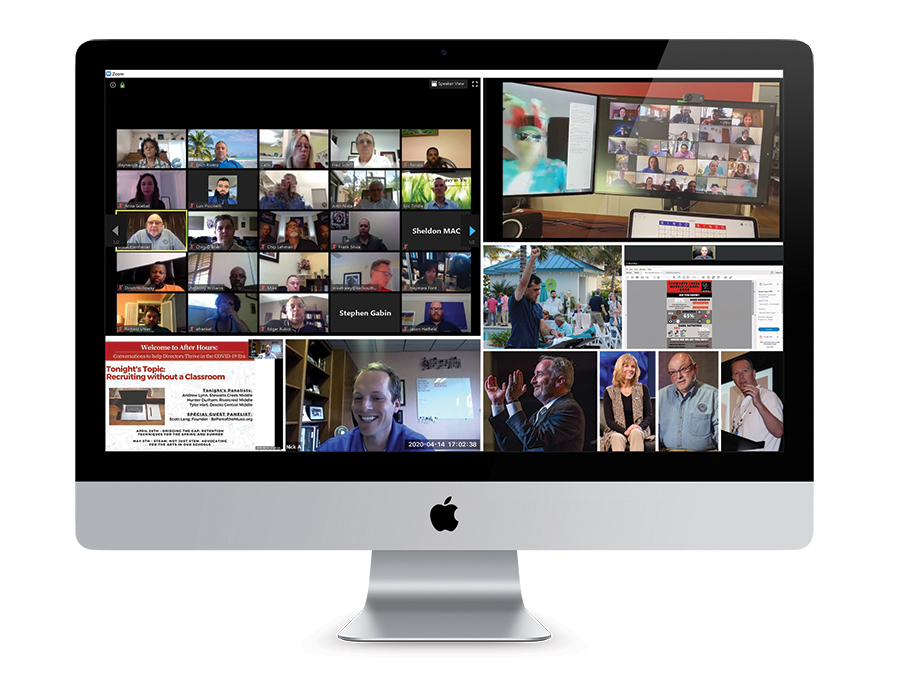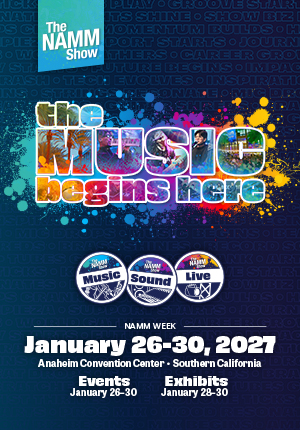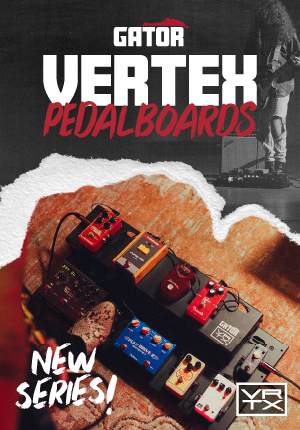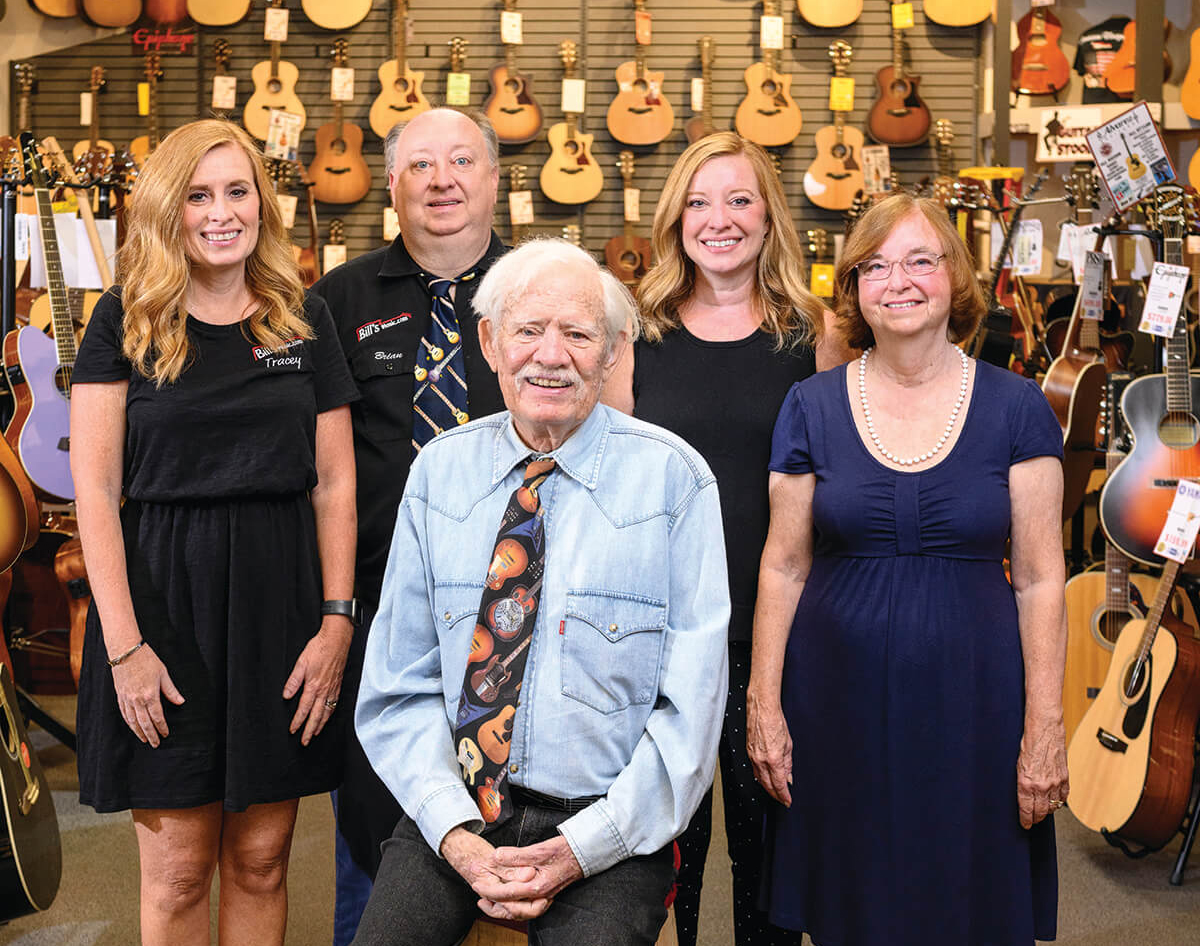
May 12, 2020 I Feature
School Music Goes Virtual
In an effort to communicate with their schools — and each other — school music dealers, like much of the nation, have gone online.
By Frank Alkyer
From Zoom meetings, YouTube videos and increased social media entries to virtual game nights and online cocktail hours, many retailers, associations and educators have quickly tapped into technology to stay connected to their customers and peers.
NASMD Zooms
When the National Association of School Music Dealers was forced to cancel its March Convention due to the coronavirus pandemic, it left a huge void in the business and social calendar, as well as questions about what to do next.
First, the organization had to deal with how to conduct its annual meeting of members, a required event, without being able to have a physical meeting.
The answer came in the form of a Zoom videoconference, which has become a staple of doing business in the age of the pandemic.
The NASMD board gathered approximately 60 members to the virtual meeting on March 26. What traditionally has been a quick, cut-and-dried portion of the NASMD Convention became a chance to safely gather and band together in solidarity for some of the nation’s top school music dealers.
“We should be in St. Petersburg right now, together, in the sun, enjoying each other’s company and giving each other real hugs instead of virtual hugs,” said Whitney Brown Grisaffi, NASMD president, in regard to the canceled convention. “But we will move forward and, staying in a positive light, we will get through this.”
Brown Grisaffi, who is also the president of Ted Brown Music in Tacoma, Washington, opened the meeting by reporting the organization was able to call off the event without cancellation fees.
“The good news is, in light of everything, we have been able to persevere, and the hotel has canceled our contract without damages,” said Brown Grisaffi. “So, we have been released from a $300,000 no-conference bill.”
What seems obvious now was touch-and-go back in March. NASMD had to wait for the governor of Florida, Ron DeSantis, to declare a state of emergency before it could call off the event without damages.
The next issue came in the form of how to handle convention sponsorships and registration fees that had already been paid.
The board sent out a message to members and sponsors to make a choice on their registration and sponsorship money. The choices were to get a full refund, get a refund but leave some as a donation or carry over the funds until 2021.
Many chose to carry over their fees or give a donation.
“Thanks to our really responsible past presidents, we have been able to grow the reserves and maintain the reserves at a level that would help us in a situation like the one we’re going through right now,” Brown Grisaffi said.
The dealers also voted in a new board of directors for 2020-2021. They are CJ Averwater, Amro Music; Gayle Beacock, Beacock Music; Cris Behrens, Summerhays Music; Paul Finke, Willis Music; Whitney Brown Grisaffi, Ted Brown Music; Tamara Kautzman, Eckroth Music; Rick Thacker, Plum Grove Music; and Ryan West, West Music.
NASMD Gets Social, Too
Once the meeting was complete, the NASMD board decided to set up a Facebook sharing group for school music dealers, one that served several purposes like asking pertinent questions about dealing with the pandemic and simply saying hello or dropping in interesting ideas for connecting with educators.
Early posts from late March centered around which stores and states had been shut down, what services could be kept open and who was doing online lessons or curbside pickups. The conversation soon turned to those who could still offer instrument petting zoos or instrument trials before purchase or rental, as well as questions about best practices for collecting on rental instruments during the pandemic.
By the end of April, as schools closed and retail services were limited or shut down, depending on the state, some retailers were beginning to wonder how stores, lessons and repairs would reopen… and when. While dealers in some states were looking at late April and early May, others were not so confident.
“Not any time soon,” said Myrna Sislen, owner of Middle C Music. “We are not even open and won’t be for at least another month.”
Even in the midst of the quarantine, retailers still found a way to have a little fun and show some creativity, too.
In early April, Mike Meyer, president of Meyer Music Company in St. Louis, Missouri, told the group that his company invited its educators to a Zoom conference call to play a game of “bunker bingo.” With 84 educators signing up, they were able to play six games of virtual bingo for about 90 minutes.
“Cris Behrens [from Summerhays Music in Utah] was our DJ and had a blast doing the ‘YMCA’ to kick it off,” Meyer said. “We did music trivia throughout and gave away some cool prizes donated by a few of our suppliers.
“When coronavirus hands you lemons, make Zoom lemonade!” he said.
After Hours… Online
Several school music dealers have been taking the concept of Zoom meetings for educators to another level.
Amro Music, headquartered in Memphis, Tennessee, started its After Hours series of panel discussions to give educators an opportunity to hear from their peers about a variety of topics in connection to dealing with the pandemic.
On April 26, Nick Averwater, Amro’s band department manager, moderated a discussion on recruitment that drew 290 attendees. He invited three middle school educators and Scott Lang, the nationally known music education and leadership speaker, to offer insights on teaching and recruiting with schools being closed.
“A couple of days ago, one of my students in my jazz band class asked if we could get together on Zoom, not even talk about band, and just catch up,” said Tyler Hart, band director at DeSoto Central Middle School in Southaven, Mississippi. “And I was like ‘Yeah, duh, of course.’ Then she invited me to be a part of that. So, I got on a few minutes after they started, and we had a really nice 45-minute conversation. Just shooting the breeze. Kids were telling jokes, and kids were having a really good time. It’s just great to see that sense of community still thriving during this crazy time.”
In terms of recruiting, the panelists understood that they would have challenges and planned to work over the summer and gear up for a busy fall.
“Our challenge for next year is getting those returning band members visible to those incoming students and letting them see kids play horns and see what they’re going to be doing,” said Andrew Lynn, band director at Stewarts Creek Middle School in Smyrna, Tennessee. “We know that coming back to school is going to be more of a celebration than it ever has been. So, we’re looking at ways to get the band to be a part of that. We want the band to be the first thing they see when they come back to school.”
Hart said he is planning a multi-pronged approach toward recruiting this summer that will include email, phone calls and physical packets for students who may not have internet access.
“So, what we have been doing is sending out a bunch of packets to the elementary school teachers and elementary school principals,” he said. “They’re posting that on their websites and have a dropoff area where parents can get packets for parents that don’t have resources like a printer.
“Over the summer we plan on hitting a phone tree. One of most effective ways to getting ahold of people is calling.”
For Hunter Durham and Sebastien Isom, band directors at Rivercrest Middle School in Rivercrest, Arkansas, technology plays a key role in recruiting.
They have created a PowerPoint presentation that helps sell the excitement and benefits of joining band in less than 30 minutes. Using it during recruiting has helped them recruit up to 60% of an incoming class into band.
Lang applauded the efforts of music educators, noting that this moment is a crisis but also will present opportunities. He said that in the fall, parents may be tightening the belt on paid after-school activities like sports clubs.
“But we’ll have the same number of kids in this country, and they’re looking for something to do,” he said. “And I swear, if we do this right, we shouldn’t just survive, we should thrive in this environment. We should grow our programs. If we fail to do that, it’s nobody’s fault but our own.
“I’m not looking to survive the next year, I’m looking to grow my program by 20% next year. Whether I do, or whether I don’t, I can’t predict, but, by God, I’ll make no apologies about that. Let’s go get every kid to be part of the music.”
Beyond retention, Amro Music conducted a variety of other After Hours events on retention and music advocacy as well as online teaching and student engagement.
Getting the Band Back Together Again
At All County Music, in Tamarac, Florida, company owner Fred Schiff took a slightly different approach with his Zoom meeting, inviting a few dozen middle school educators to a round-table discussion.
Calling the meeting “Getting the Band Back Together Again,” topics ranged from how many students had instruments at home to how to handle instruments once they were returned.
One educator said he planned to put them in a place where they would not be touched for the summer, in essence quarantining the instruments, letting any possibility of the virus die over the summer.
“Clorox swabs and wipes will be our friends on this one,” said another. “All instruments will be cleaned in the fall before they go back into the hands of students.”
But educators were also concerned about students or parents trying to clean the instrument themselves, and how they would approach it.
“The idea of having students clean instruments can be terrifying,” noted another. “Especially woodwinds.”
That prompted a participant to suggest all students go to “Beginning Band Bootcamp” on YouTube before trying to clean their horn. Videos on the site offer step-by-step guidance on how to properly clean an instrument.
According to another educator, the National Federation of State High School Associations said the National Association for Music Education is working with the Centers for Disease Control and Prevention to create guidelines on how to collect and clean instruments.
When it came to online teaching, educators agreed that they were making the best of a difficult situation.
“In times like this, you have to focus on engagement over assessment, mentorship over music,” said Eric Tindle, band director at Westwood Christian School in Miami, Florida.
Enter Dr. Tim
Famed educator and clinician Dr. Tim Lautzenheiser, vice president of education for Conn-Selmer, served as a special guest for the meeting. He said the qualities it takes to tackle a difficult piece of music also apply to getting through this pandemic, then he paraphrased a quote from President Calvin Coolidge.
“Nothing in this world can take the place of persistence,” he said. “Persistence and determination alone are omnipotent.
“The ones who come out lesser than or in trouble are the ones who throw their hands in the air and give up.”
Lautzenheiser also said the Conn-Selmer Institute this summer will be moving online in response to the pandemic.
“Given the current situation, we were going to close it down this summer, but our new president, Steve Zapf, said, ‘We’re not going to quit. We’re not going to shut down.’”
As a result, The Conn-Selmer Institute was scheduled to be conducted online on June 8-9 with each session being recorded and available to attendees for the rest of the year. MI











